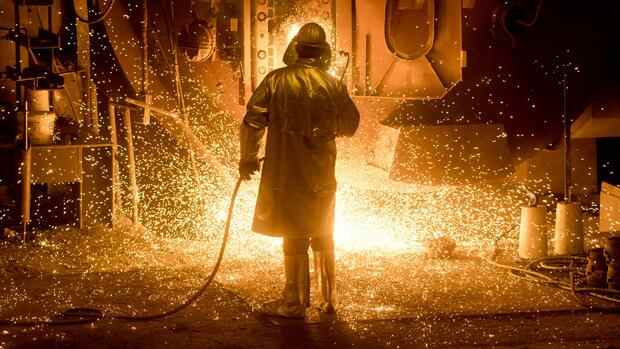Things will get really serious from 2026, when importers of steel, aluminum, cement, fertilizers and electricity will have to pay an estimated 75 euros per ton of CO2 emissions.
(Photo: dpa)
The concept of “carbon pricing” – the charging of a fee for every tonne of carbon dioxide emitted by industry – is firmly anchored in climate and sustainability policy in many countries. This also applies to the EU. The higher the CO2 price rises, the more local producers are exposed to the risk of carbon leakage, that is, the CO2 is simply emitted elsewhere and they lose market share compared to cheaper imports from countries with less stringent climate regulations.
So far, EU manufacturers have received free CO2 certificates to prevent such CO2 shifts. These free grants will now expire. Instead, a CO2 border tax is to be introduced to prevent the relocation of production to avoid EU climate costs. In theory, that’s a good concept. In practice, it poses some problems.
As early as January 2023, importers will be confronted with considerable administrative costs. They need to calculate the emissions contained in their products and have this data verified independently. In addition, they must ensure that the emissions are properly reported to the competent authorities.
Importers are liable if they don’t follow the rules. In fact, the EU is making imports more expensive through non-tariff barriers, others call it protectionism. And it should be understood that way.
Top jobs of the day
Find the best jobs now and
be notified by email.
Things will get really serious from 2026, when importers of steel, aluminum, cement, fertilizers and electricity will have to pay an estimated 75 euros per ton of CO2 emissions. The tax rate is expected to be 100 euros per ton by 2030, and then more products are likely to be recorded.
The unwinding of globalization is at the expense of the poor
The Boston Consulting Group anticipates cost increases of 15 to 30 percent and recommends moving production back to the EU as a response. Politically, such a relocation would certainly be most welcome, since it could be cited as proof of the creation of “climate-friendly prosperity” (election manifesto of the Greens).
Daniel Stelter is the founder of the discussion forum beyond the obvious, which specializes in strategy and macroeconomics, and is a management consultant and author. Every Sunday his podcast goes online at www.think-bto.com.
(Photo: Robert Recker / Berlin)
However, this reversal of globalization is at the expense of the poorest in the world and shifts the burden of climate policy in the industrialized countries to the developing countries, which have much more difficult prerequisites to cope with the conversion towards CO2 neutrality. That is not fair.
From a German point of view, there is another aspect. For quite a few export-oriented companies, taking the demographic development into account, the opposite approach should be worthwhile: relocating production to the markets of the future.
The same applies here to the CO2 border tax: The opposite of “good” is “well meant”. The federal government should work for better solutions in the EU.
More: Column – “Global Trends”: Climate change knows no national borders, but climate protection does
